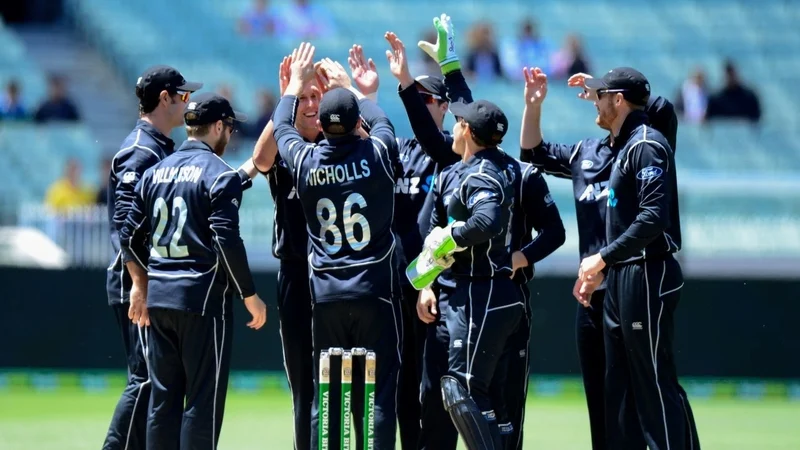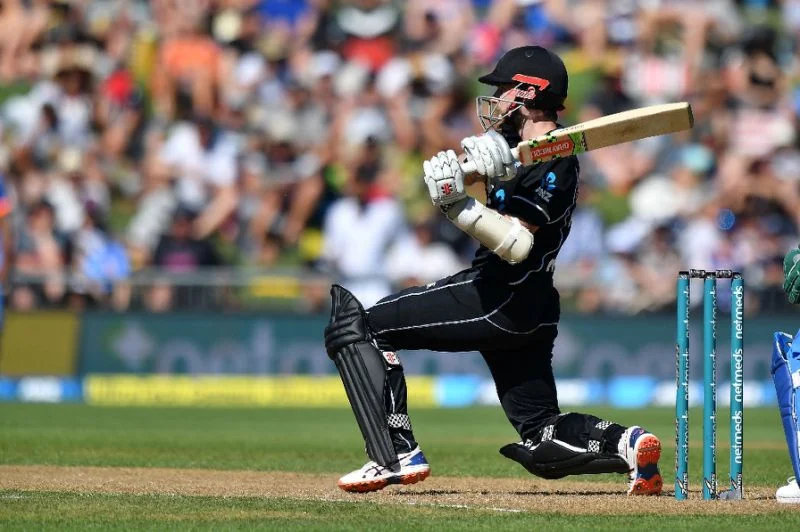In a surprising twist to New Zealand’s cricketing narrative, Michael Bracewell will don the captain’s armband on home soil for the first time as the Black Caps face off against a formidable Pakistan side in a five-game T20 series. With several key players absent due to commitments in the Indian Premier League (IPL), the Kiwis have been forced to assemble a squad that, while talented, lacks some of its usual stalwarts. This series, scheduled to kick off on March 16 in Christchurch, promises to be a stern test of adaptability, resilience, and leadership for Bracewell and his men.
A New Chapter Under Challenging Circumstances
Michael Bracewell, who impressed admirers during the Black Caps’ memorable run to the Champions Trophy final, now finds himself at the helm of a side that has been significantly depleted by the IPL. Among the casualties of the IPL window are regular skipper Mitchell Santner, prolific batsman Devon Conway, dynamic pacer Lockie Ferguson, and all-rounder Glenn Phillips. Even cricketing great Kane Williamson has opted out, citing personal reasons, leaving Bracewell with the daunting task of guiding a less experienced outfit through an international series.
“It’s a great honour and a real privilege to captain my country,” Bracewell said in a recent press conference. “Mitchell Santner has done an excellent job as the white-ball captain, and I’m committed to building on the strong foundation he’s established. Our focus will be on creating an environment where every player can perform at their best, despite the challenges ahead.”
Bracewell’s appointment as captain marks a significant milestone in his career. Although he has previously led the side on a white-ball tour of Pakistan, this will be his first opportunity to lead a home series, and it comes at a time when expectations are tempered by the absence of several marquee players.

Navigating a Shifting Squad
New Zealand’s current T20 squad reflects a mix of promising young talent and experienced campaigners. Alongside Bracewell, the side features names such as Finn Allen, whose aggressive batting has caught the eye of selectors, and Jimmy Neesham, known for his all-round capabilities. The inclusion of Mark Chapman, Jacob Duffy, and Tim Seifert adds further balance to the batting order, while Ish Sodhi has been recalled to bolster the spin department. Additionally, paceman Ben Sears is back in contention after recovering from a torn hamstring, and his return will be keenly watched by fans and analysts alike.
Despite the absence of stalwarts like Santner and Ferguson, the Black Caps are determined to demonstrate that depth and adaptability can overcome any short-term setbacks. Coach and support staff are optimistic that the squad’s collective energy and tactical flexibility will be key factors in overcoming the gap left by their missing stars. With the T20 World Cup on the horizon next year in India, these series are also seen as a valuable opportunity for emerging players to prove themselves on the international stage.
A Formidable Opponent in Pakistan
New Zealand will face a Pakistan side that is widely regarded as one of the most dangerous T20 units in world cricket. Known for their potent combination of power-hitting and pace, the Pakistan team is always a threat in the shorter format of the game. Bracewell himself acknowledged the challenge ahead, stating, “Pakistan are always a dangerous short-form side with lots of power and pace. We know they’ll be looking to take advantage of any lapse in concentration, so we’ll have to be at our very best from the very first ball.”
Pakistan’s recent performances have shown that they are capable of setting high targets and chasing down challenging scores, making them a formidable adversary even in a shortened series. Their ability to adapt quickly to different conditions and to turn games on their head has earned them a reputation as true match-winners. For the Black Caps, the task will be to maintain a strong defensive structure while also capitalizing on scoring opportunities whenever they arise.
Tactical Innovations and Strategic Adjustments
With a revised squad in hand, Bracewell is expected to implement tactical innovations that might surprise both opponents and fans. The absence of several experienced players could encourage a more experimental approach, with younger members being given the freedom to express themselves in high-pressure situations. This could lead to unconventional batting orders, unorthodox field placements, and an increased reliance on aggressive, yet calculated, gameplay.
Analysts suggest that New Zealand might adopt a more flexible strategy, balancing the need to be defensively solid with the requirement to accelerate the scoring rate when the situation demands it. The team’s performance in the Champions Trophy, where Bracewell played a pivotal role, indicates that he has the temperament and tactical acumen required to lead a team through turbulent times. “I’ll be trying to build on the good work done by our previous captain and create an enjoyable environment for the players,” Bracewell remarked. “Our goal is to take the best out of every match and use this series as a stepping stone towards our larger ambitions.”
Preparing for a Long Series
The five-match T20 series is set to test the depth and endurance of both teams. Matches will be played across different venues—starting in Christchurch on March 16, followed by games in Dunedin, Auckland, Mount Maunganui, and concluding in Wellington on March 26. Each venue brings its own unique challenges, from varying pitch conditions to differing crowd atmospheres. For the Black Caps, adapting to these conditions quickly will be essential, especially in the absence of some of their most seasoned players.
The series also represents an opportunity for the coaching staff and selectors to observe how emerging players cope under pressure, providing valuable insights as they build their squads for future international tournaments. With the T20 World Cup approaching, every match in this series is crucial for team building, strategy refinement, and confidence boosting among the less experienced members.
A Balancing Act Between IPL Commitments and National Duties
The concurrent scheduling of the IPL has been a double-edged sword for New Zealand cricket. On one hand, the IPL attracts the top talent from across the globe, offering players exposure to high-intensity competition and lucrative contracts. On the other hand, it often leads to the unavailability of key national players during important series. The current situation is a prime example of this dilemma, with some of New Zealand’s brightest talents missing from the squad.
For the fans, the absence of players like Mitchell Santner, Devon Conway, Lockie Ferguson, Glenn Phillips, and Kane Williamson is deeply felt. These players have not only contributed significantly to the team’s success in recent years but have also been icons of consistency and excellence. However, this series also presents a unique challenge for the national selectors and the management, who must balance the commercial allure of domestic leagues like the IPL with the long-term interests of national team development.
Embracing the Opportunity for Growth
While the immediate challenge is to secure victories in the T20 series against Pakistan, the broader goal for New Zealand cricket is to nurture the next generation of talent. The absence of some key players might, in fact, serve as a blessing in disguise by providing emerging stars with the opportunity to prove themselves on the international stage. Players like Finn Allen, Jimmy Neesham, and Tim Seifert will be keen to showcase their abilities and stake a claim for a regular spot in the national setup.
Moreover, the series offers a chance for the coaching staff to experiment with new strategies, assess player combinations, and identify areas that need improvement. This period of transition, though challenging, is an integral part of the evolution of any successful sports team. The experiences gained during such series often shape the team’s character and resilience, laying the groundwork for future successes.
Public and Media Expectations
The media and cricket pundits have been abuzz with discussions about Bracewell’s appointment and the potential impact of the depleted squad. While some critics are skeptical about New Zealand’s prospects against a traditionally strong Pakistan side, others are optimistic, highlighting the unpredictability and excitement inherent in T20 cricket. Fans are eagerly anticipating what promises to be an enthralling series filled with high stakes, dynamic performances, and moments of individual brilliance.
Social media platforms have been awash with both support for Bracewell’s leadership and critiques of the scheduling conflicts that have sidelined top players. However, the prevailing sentiment is one of cautious optimism—a belief that adversity often brings out the best in a team. As Bracewell leads the side, his focus will be on building a cohesive unit that can rise to the occasion, regardless of the obstacles in their path.
The Road Ahead
As the countdown to the first match in Christchurch begins, all eyes will be on Michael Bracewell and his newly appointed leadership role. The series against Pakistan is more than just a contest for points—it is a proving ground for a team in transition. The coming weeks will reveal whether the Black Caps can adapt to their new reality, harness the potential of their emerging players, and execute the innovative strategies envisioned by their leadership.
For Bracewell, this is an opportunity to cement his place as a capable and inspiring leader for New Zealand cricket. For the players, it is a chance to step up when the stakes are high, to learn from the experience, and to contribute to the legacy of the Black Caps. And for the fans, it is a period of anticipation, hope, and the promise of witnessing the next chapter in the evolution of New Zealand cricket.










